|
Rose Jaji (Phd) Senior researcher at the German Institute of Development and Sustainability (IDOS) 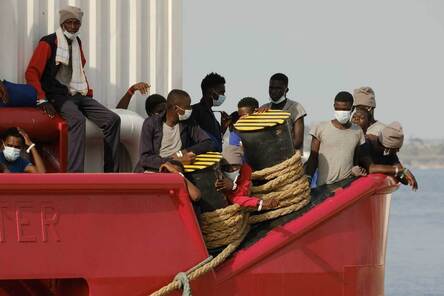 Credit: Alessio Tricani/Shutterstock Credit: Alessio Tricani/Shutterstock The idea of migration trajectories that crisscross the globe as one of the hallmarks of globalization creates the impression that everyone from the disparate parts of the world can move. This apparent possibility for everyone to participate in global migration masks unequal mobility opportunities that are embedded in dichotomous categorizations of mobility at regional, national, and individual levels. Global migration is disaggregated into North-South, South-North, North-North and South-South. This is replicated at national level by classification that designates countries in binary terms as either sending or receiving countries notwithstanding the fact that countries can straddle this boundary and act as points of transit. Construed as mere references to geography and physical borders, these categories seem benign. However, in reality they generate a correspondingly regionalized and nationalized migration nomenclature that influences how the individual is situated and classified in global migration trajectories. The distinctions at global and national levels show a pattern that coalesces into a migration lexicon that privileges mobility by the affluent and problematizes that by the poor.
0 Comments
Rose Jaji (PhD) Senior researcher at the German Institute of Development and Sustainability (IDOS) 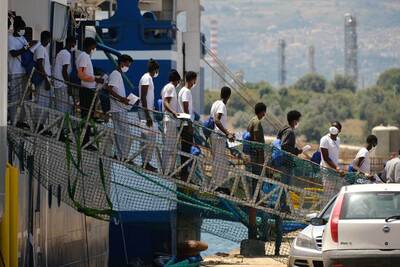 Credit: Alessio Tricani/Shutterstock Credit: Alessio Tricani/Shutterstock This book, which came out of research conducted in 2021 with non-migrants in Zimbabwe, is set against the background of a significant increase in the number of people migrating out of Zimbabwe since the onset of the country’s economic and political woes at the turn of the twenty-first century. The book starts from the premise that in contexts where migration has become the most viable route out of economic and political turmoil, non-migration becomes the anomaly deserving scrutiny. The book sets out to explain who does not migrate and why in a country which has experienced massive emigration characterized as an “exodus” (Betts 2010; Crush and Tevera 2010; Masawi 2016). It argues that macroeconomic factors do not necessarily lead to migration and discusses how individual subjectivities mediate these factors leading to non-migration despite or, ironically, because of such factors. The non-migration decision involves a complex interplay of economic, sociocultural, and political factors such that people may not migrate even if they are adversely affected by the economic crisis and have the means to migrate. Dr. Christopher Zambakari Founder & CEO, The Zambakari Advisory Hartley B. and Ruth B. Barker Endowed Rotary Peace Fellow Assistant Editor, Bulletin of The Sudan Studies Association 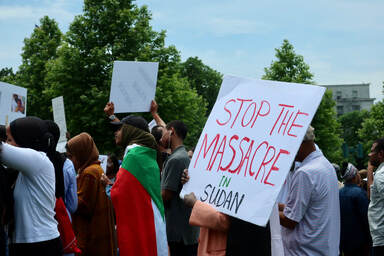 Credit: DCStockPhotography/Shutterstock Credit: DCStockPhotography/Shutterstock As a global citizen, and as a native of South Sudan, I am deeply concerned about the ongoing crisis in the land of my birth. The country has been plagued by violence and political instability for decades, and the situation only gets worse with each passing day. With this in mind, I am drawn to share with you my analysis of the conflict in Sudan, its historical context, the key players and the impact the constant turmoil continues to have on the Sudanese people. I have in mind some solutions as well. Dr. Christopher Zambakari Founder & CEO, The Zambakari Advisory Hartley B. and Ruth B. Barker Endowed Rotary Peace Fellow Assistant Editor, Bulletin of The Sudan Studies Association 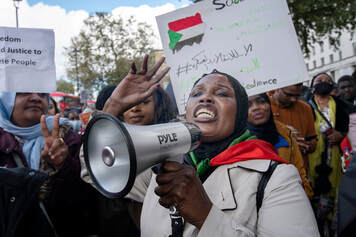 Credit: Koca Vehbi/Shutterstock Credit: Koca Vehbi/Shutterstock Sudan is in crisis. Again. Sudan is further tattered, further cleaved and mutilated. The third-largest country in Africa has been marred by political instability and violence for decades. The country has experienced multiple civil wars, military coups and political upheavals. Chaos and states of emergency are almost commonplace, and millions of her people have been displaced. Poverty is widespread and political oppression is the order – or disorder – of the day. Again. Dr. Christopher Zambakari Founder & CEO, The Zambakari Advisory Hartley B. and Ruth B. Barker Endowed Rotary Peace Fellow Assistant Editor, Bulletin of The Sudan Studies Association 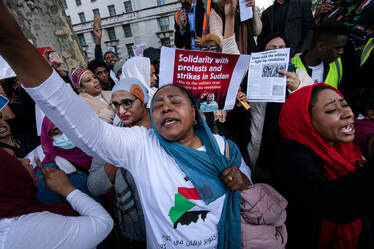 Credit: Koca Vehbi/Shutterstock Credit: Koca Vehbi/Shutterstock Sudan is a country in northeast Africa that has been marred by violence and conflict for several decades. The ongoing conflict in Sudan has resulted in countless deaths and displacement of millions of people. The conflict has also had a devastating impact on the country’s social and economic fabric, leaving the country in a state of turmoil. This article explores the social historical context of the conflict in Sudan, how it came to be, and what led to the violence. Also discussed is what the international community, United Nations, African Union, and Arab League can do to bring the violence to an end. Nichola Mandil Ukeil South Sudan journalist, Instructor, Starford International University, South Sudan 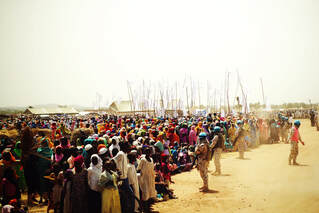 Credit: For Her/Shutterstock Credit: For Her/Shutterstock Conflict in Sudan? You may wonder which conflict, which war, which collision of arms and general butchery it is that has most recently caught the international community’s attention. The latest test of wills is a war not a month old and commanded by generals. Commanded by generals, in fact, who have been comrades in “arms and fate” for nearly four years since former Sudanese President Omar El-Bashir was ousted in 2019. Dr. Christopher Zambakari Founder & CEO, The Zambakari Advisory Hartley B. and Ruth B. Barker Endowed Rotary Peace Fellow Assistant Editor, Bulletin of The Sudan Studies Association 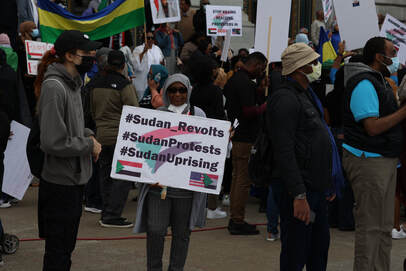 Sudan is in crisis. Again. Sudan is further tattered, further cleaved and mutilated. The third-largest country in Africa has been marred by political instability and violence for decades. The country has experienced multiple civil wars, military coups and political upheavals. Chaos and states of emergency are almost commonplace and millions of Sudanese people have been displaced. Poverty is widespread and political oppression is, again, the order – or disorder – across the country. May 10, 2023 Dr. Christopher Zambakari Founder & CEO, The Zambakari Advisory Hartley B. and Ruth B. Barker Endowed Rotary Peace Fellow Assistant Editor, Bulletin of The Sudan Studies Association 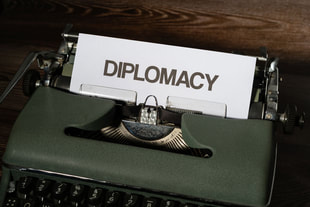 Recently, The Zambakari Advisory sat down with Ambassador Freeman in a wide-ranging Zoom call, posing questions on a series of subjects relating to the war in Ukraine, U.S. relations with China, the state of U.S. diplomacy, and the role of Africa and its emerging countries in a world shifting from unipolarity to multipolarity. Considered one of the “whiz kids” of the U.S. State Department when he entered the foreign service in 1965, Chas Freeman Jr. was for nearly 50 years involved in diplomatic service to his country including serving as U.S. Ambassador to Saudi Arabia under President George W. Bush, assistant secretary of defense during the Clinton administration, and interpreter for President Richard Nixon during the path-breaking 1972 China visit. Below are other excerpts from the March interview with Ambassador Freeman. Read the full issue published by Global Policy here! John Ashworth South Sudan Analyst and Adviser to both the Church Council and to the country’s Catholic Bishops 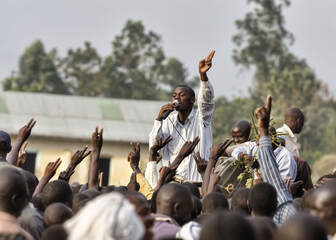 gaborbasch / Shutterstock.com gaborbasch / Shutterstock.com “Peace usually has a price,” an Irish missionary friend is fond of telling me (especially after a drink or two), “and working for peace is harder than working for justice”. He was very involved in South Africa's anti-apartheid struggle, and he knows what he's talking about. The price is often paid by those who are perceived as holding the moral high ground, and by the victims. It involves looking for a “win-win” situation, which necessarily involves compromise. Rose Jaji (PhD) University of Zimbabwe, Harare, Zimbabwe 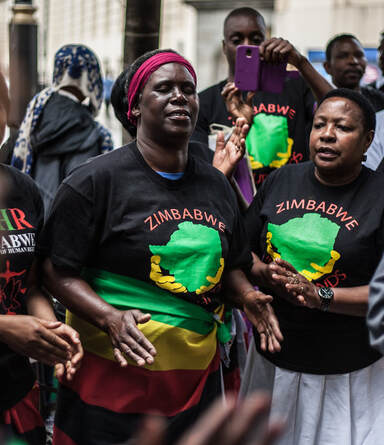 LONDON - JUNE 27TH, 2015: Unidentified woman at the "Zimvigil" protest outside the Zimbabwean Embassy protesting human rights violations by Robert Mugabe. Credit: Tom Brittney/ Shutterstock.com LONDON - JUNE 27TH, 2015: Unidentified woman at the "Zimvigil" protest outside the Zimbabwean Embassy protesting human rights violations by Robert Mugabe. Credit: Tom Brittney/ Shutterstock.com Women appear in much of the literature on violence as victims because violence is generally understood in terms that limit it to its direct or physical form, which is predominantly associated with men. The main result of masculinization of violence and its limitation to physical attack in the study of gender and violence is the pathologization of women, which obscures their political agency. Although women’s perpetration of direct violence is limited and largely unobtrusive relative to men in many conflict situations, women are conspicuous in perpetration of cultural violence, which Galtung (1990, 29) defines as “any aspect of culture that can be used to legitimize violence in its direct or structural form.” Cultural violence takes numerous forms that include art, science, ideology and language. Although it appears to be harmless, cultural violence justifies and legitimizes direct violence (Galtung 1990), and the two forms of violence are mutually constitutive. Cultural violence renders the idea of direct violence a palatable and appropriate response to perceived enemies identified through political ideology articulated through relevant language in Zimbabwean politics. The political discourse in Zimbabwe constitutes an integral component of cultural violence whose distinctive characteristics are name-calling and hate speech, which are exemplified by the depiction of political adversaries as puppets, traitors, and enemies who are a threat to the country and need to be “crushed.” |
Archives
October 2023
Categories
All
|
Copyright © 2023 The Zambakari Advisory - Privacy Policy
Our site uses cookies to improve your experience. You can control cookies by adjusting your browser or device settings.
If you continue without changing your settings, we assume that you are happy to receive all cookies.
If not, please feel free to opt out here.
SEO by Qasim Khilji
Our site uses cookies to improve your experience. You can control cookies by adjusting your browser or device settings.
If you continue without changing your settings, we assume that you are happy to receive all cookies.
If not, please feel free to opt out here.
SEO by Qasim Khilji
